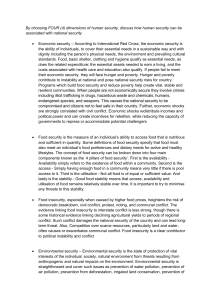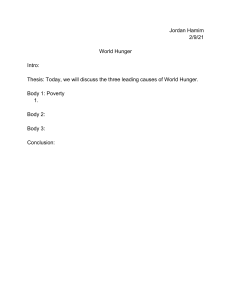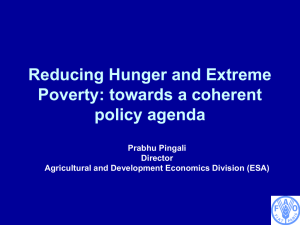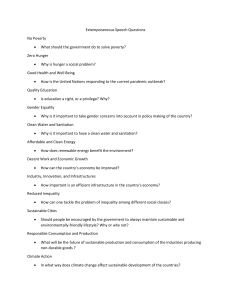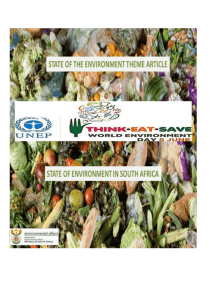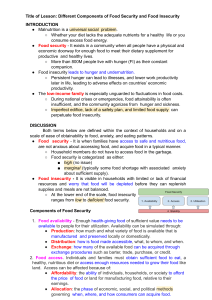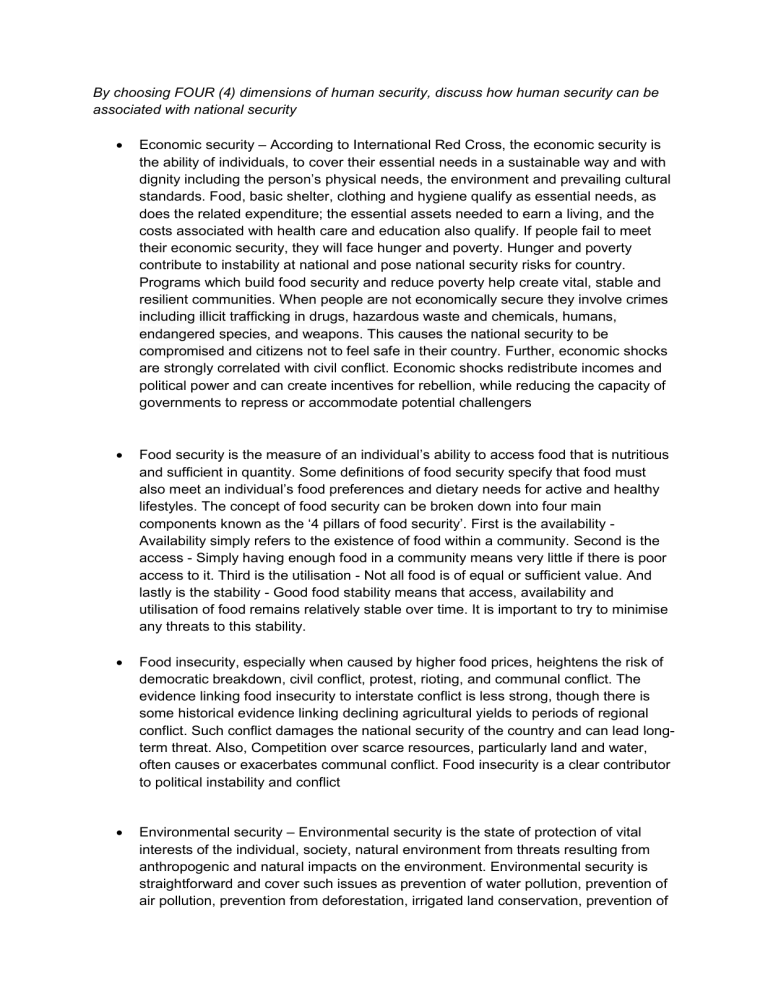
By choosing FOUR (4) dimensions of human security, discuss how human security can be associated with national security Economic security – According to International Red Cross, the economic security is the ability of individuals, to cover their essential needs in a sustainable way and with dignity including the person’s physical needs, the environment and prevailing cultural standards. Food, basic shelter, clothing and hygiene qualify as essential needs, as does the related expenditure; the essential assets needed to earn a living, and the costs associated with health care and education also qualify. If people fail to meet their economic security, they will face hunger and poverty. Hunger and poverty contribute to instability at national and pose national security risks for country. Programs which build food security and reduce poverty help create vital, stable and resilient communities. When people are not economically secure they involve crimes including illicit trafficking in drugs, hazardous waste and chemicals, humans, endangered species, and weapons. This causes the national security to be compromised and citizens not to feel safe in their country. Further, economic shocks are strongly correlated with civil conflict. Economic shocks redistribute incomes and political power and can create incentives for rebellion, while reducing the capacity of governments to repress or accommodate potential challengers Food security is the measure of an individual’s ability to access food that is nutritious and sufficient in quantity. Some definitions of food security specify that food must also meet an individual’s food preferences and dietary needs for active and healthy lifestyles. The concept of food security can be broken down into four main components known as the ‘4 pillars of food security’. First is the availability Availability simply refers to the existence of food within a community. Second is the access - Simply having enough food in a community means very little if there is poor access to it. Third is the utilisation - Not all food is of equal or sufficient value. And lastly is the stability - Good food stability means that access, availability and utilisation of food remains relatively stable over time. It is important to try to minimise any threats to this stability. Food insecurity, especially when caused by higher food prices, heightens the risk of democratic breakdown, civil conflict, protest, rioting, and communal conflict. The evidence linking food insecurity to interstate conflict is less strong, though there is some historical evidence linking declining agricultural yields to periods of regional conflict. Such conflict damages the national security of the country and can lead longterm threat. Also, Competition over scarce resources, particularly land and water, often causes or exacerbates communal conflict. Food insecurity is a clear contributor to political instability and conflict Environmental security – Environmental security is the state of protection of vital interests of the individual, society, natural environment from threats resulting from anthropogenic and natural impacts on the environment. Environmental security is straightforward and cover such issues as prevention of water pollution, prevention of air pollution, prevention from deforestation, irrigated land conservation, prevention of natural hazards such as droughts, floods, cyclones, earthquakes etc. Climate change may also be considered a national security threat as its long-term effects may bring disastrous ecological consequences. However, because this is a threat that all nations face, and because much of the work done to fight climate change is done through international coalitions, climate change is more often regarded as a global security issue. The direct effects of climate change are readily apparent around the world—melting glaciers, rising sea levels, thawing permafrost, longer droughts, hotter heat waves, persistent wildfires, torrential rains, and catastrophic storm systems. These effects create disastrous consequences for humans like crop failures, fishery collapses, water insecurity, and the inundation of coastal regions, all of which lead to mass migration and displacement. These situations lead to fragile states and regions where increased conflict over scarce resources allows malign actors thrive. In this way, climate change is a threat multiplier that touches every aspect of international security. Political security is concerned with protection of human rights and well-being of all people. It also includes protection against people from state repression such as freedom of press, freedom of speech, and freedom of voting. Abolishment of political detention, imprisonment, systematic ill treatment, and disappearance are also covered under political security. When political security is damaged, people’s rights are violated, the repression state causes people to suffer, and in response people rebel by creating rebel groups, or forming violent demonstrations or joining extremist groups. Countries that limit political freedom create an environment that people rebel and fight back to overthrow the system. This leads the country to and its people to go into crisis which is very damaging to the national crisis. Community security on the other hand covers conservation of traditional and cultures, languages and commonly held values. It also includes abolishment of ethnic discrimination, prevention of ethnic conflicts, and protection of indigenous people. If people are marginalized, Marginalisation and social division prevent communities from living in peace. The outcome of social exclusion is that affected individuals or communities are prevented from participating fully in the economic, social, and political life of the society in which they live. This may result in resistance in the form of demonstrations, protests or even crimes and armed conflicts to terrorism. In sum up, human security is the cornerstone of national security – when individual humans are suffer any kind of situations that threaten their live including persistent poverty and employment, hunger and famine, deadly infectious diseases, unsafe food, malnutrition, lack of access to basic health care, environmental degradation, resource depletion, natural disasters, pollution, inter-ethnic and community based tensions, and political repression and human rights abuses, then the national security of the country becomes risk of collapse. Without human security, the aggregate security of the people will fragmentate and get damaged. Reference: MacFarlane, S. N., & Khong, Y. F. (2006). Human security and the UN: A critical history. Indiana University Press. Mahmud, H., Quaisar, M. M., Sabur, A., & Tamanna, S. (2008). Human security or national security: the problems and prospects of the norm of human security. J. Pol. & L., 1, 67. Fullbrook, D. (2010). Food as security. Food Security, 2(1), 5-20.
